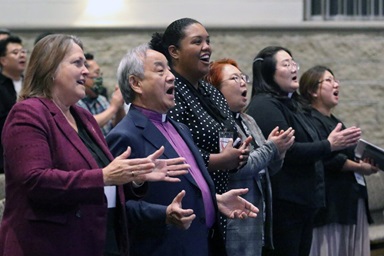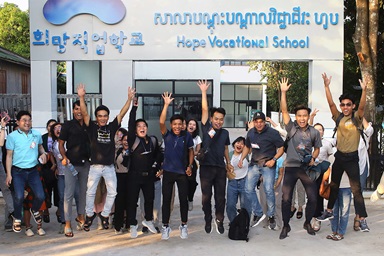Three months have passed since Bishop Joel Martinez made an emergency pastoral visit to Indonesia, but he has not forgotten the faces of the children in the camps for those left homeless by the Dec. 26 tsunami.
What the future holds for those children “is the call of God to me,” said Martinez, of San Antonio, who is president of the United Methodist Board of Global Ministries.
With the Rev. R. Randy Day, the board’s chief executive, Martinez co-led a January delegation to northern Sumatra—a region devastated by the tsunami—to offer solidarity to Indonesian Methodists and assess relief needs.
The church there already had set up small-scale relief operations, such as hosting volunteer medical teams at the camps. “I left with a sense that our partnership with these leaders would result in a very effective delivery of ministry in the days and the years to come,” the bishop told directors during the board’s April 11-14 spring meeting.
Triggered by an earthquake deep under the ocean floor, the tsunami killed nearly 300,000 people in Indonesia, Sri Lanka, Thailand, the Maldives, India and even Somalia. In the hard-hit Indonesian city of Banda Aceh, the April 6 New York Times reported, vast areas of rubble and debris remain, with little evidence of rebuilding or the billions of dollars in promised donations.
Besides the small-scare relief efforts, other immediate responses came from individual Methodists in Asia, according to Kyung Za Yim, president of the board’s Women’s Division and another member of the delegation. Those individuals included the division’s regional missionaries and “Bible Women”—women trained to reach out to other women in the poorest, most untouched regions of Asia.
For example, staff at a Women’s Division-supported children’s center in India took in an additional 100 people seeking shelter after the tsunami. “Hindu women and children were as welcome as Christian women and children,” Yim noted.
United Methodists as a whole have responded in an unprecedented way. Donations for South Asia tsunami relief to the United Methodist Committee on Relief, a part of the board, had reached a record-breaking $32.4 million by the end of March.
Drawing upon the church’s generosity, UMCOR’s directors approved a total allocation of $19.22 million during the April meeting for relief projects in Indonesia, Sri Lanka and India.
In Indonesia, UMCOR plans a $5 million project in partnership with the Methodist Church there to provide emergency relief and rehabilitation in four villages of the Bireun area of Sumatra Province. Assistance for rebuilding homes for 425 families, at an average cost of $3,750 per house, would employ both skilled and unskilled labor. Other program objectives include ensuring safe water and sanitation facilities, offering income-generating opportunities, and building peace and reconciliation within the communities.
The agency also is allocating $1.5 million to help fund recovery projects in Indonesia with Church World Service, a longtime partner, and contributing $1.5 million to the appeal of Action by Churches Together for Indonesia. Church World Service is the lead implementing organization for that appeal.
International Blue Crescent, a faith-based organization that partnered with UMCOR to respond to earthquakes in Turkey and Iran, is starting a construction project in the Lamno area of Aceh. UMCOR will provide $2.1 million for 700 houses and summer tents for the internally displaced people.
In Sri Lanka, UMCOR is partnering with the Methodist Church of Sri Lanka on an $8 million housing and community services project in the districts of Trincomalee, Ampara, Battacaloa, Matara and Mullaitivu. A separate $500,000 grant will be given to the Sri Lankan Methodists for emergency and rehabilitation work in the eastern region of the country.
UMCOR’s partner in India, Christian Auxiliary for Social Action, is included in the ACT appeal and is expected to have enough funds for its current tsunami work. But the United Methodist agency has designated $320,000 to support CASA’s core program to keep it functioning at an optimal level.
Another $300,000 was approved for voluntary membership fees for 2005 and 2006 in the alliance of Action by Churches Together.
Besides meeting physical needs, some of the projects also will deal with trauma counseling, community-building and interfaith relations. For the “theologically exhausted,” the Rev. Paul Dirdak, UMCOR’s chief executive, said that he and the Rev. David Wu, another board executive, would lead a seminar for about 500 Methodist pastors, seminarians and lay leaders in May in Medan, Indonesia. “We will engage in Bible study, in preaching and in prayer,” he added.
# # #
*Bloom is a United Methodist News Service news writer based in New York.
News media contact: Linda Bloom, New York, (646) 369-3759 or [email protected].
Like what you're reading? Support the ministry of UM News! Your support ensures the latest denominational news, dynamic stories and informative articles will continue to connect our global community. Make a tax-deductible donation at ResourceUMC.org/GiveUMCom.






